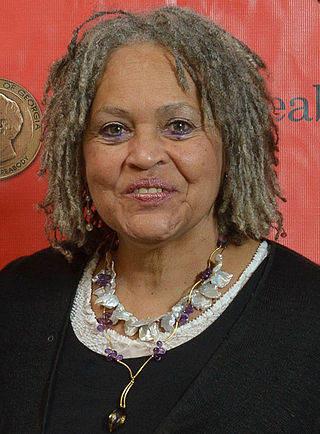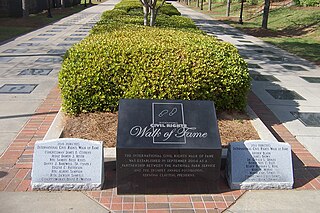Related Research Articles

Ralph David Abernathy Sr. was an American civil rights activist and Baptist minister. He was ordained in the Baptist tradition in 1948. As a leader of the civil rights movement, he was a close friend and mentor of Martin Luther King Jr. He collaborated with King and E. D. Nixon to create the Montgomery Improvement Association, which led to the Montgomery bus boycott, and co-created and was an executive board member of the Southern Christian Leadership Conference (SCLC). He became president of the SCLC following the assassination of King in 1968; he led the Poor People's Campaign in Washington, D.C., as well as other marches and demonstrations for disenfranchised Americans. He also served as an advisory committee member of the Congress on Racial Equality (CORE).

Andrew Jackson Young Jr. is an American politician, diplomat, and activist. Beginning his career as a pastor, Young was an early leader in the civil rights movement, serving as executive director of the Southern Christian Leadership Conference (SCLC) and a close confidant to Martin Luther King Jr. Young later became active in politics, serving as a U.S. Congressman from Georgia, United States Ambassador to the United Nations in the Carter Administration, and 55th Mayor of Atlanta. Since leaving office, Young has founded or served in many organizations working on issues of public policy and political lobbying.

Maynard Holbrook Jackson Jr. was an American attorney and politician who served as the 54th mayor of Atlanta, Georgia from 1974 to 1982, and again as the city's 56th mayor from 1990 to 1994. A member of the Democratic Party, he was the first Black mayor of Atlanta and of any major city in the South; his three terms made him the second longest-serving mayor in the city's history, after six-term mayor William B. Hartsfield.

Alberta Charlayne Hunter-Gault is an American civil rights activist, journalist and former foreign correspondent for National Public Radio, CNN, and the Public Broadcasting Service. Charlayne Hunter and Hamilton Holmes were the first African-American students to attend the University of Georgia.

John Hope, born in Augusta, Georgia, was an American educator and political activist, the first African-descended president of both Morehouse College in 1906 and of Atlanta University in 1929, where he worked to develop graduate programs. Both are historically Black colleges.

WAEC is an AM radio station in Atlanta, Georgia, broadcasting a Christian talk format. The station is owned by Beasley Broadcast Group, Inc., through licensee Beasley Media Group, LLC, and is known on-air as "Love 860".
WERD was the first radio station owned and programmed by African Americans. The station was established in Atlanta, Georgia on October 3, 1949, broadcasting on 860 AM. The National Black Radio Hall of Fame Atlanta Chapter is reopening WERD which still exists at its birth location and will also include a historical museum with it after renovations of the facility are completed.

Harold Baron Jackson was an American disc jockey and radio personality who broke a number of color barriers in American radio broadcasting.
WDIA is a radio station based in Memphis, Tennessee. Active since 1947, it soon became the first radio station in the United States that was programmed entirely for African Americans. It featured black radio personalities; its success in building an audience attracted radio advertisers suddenly aware of a "new" market among black listeners. The station had a strong influence on music, hiring musicians early in their careers, and playing their music to an audience that reached through the Mississippi Delta to the Gulf Coast.
Jesse Hill Jr. was an African American civil rights activist. He was active in the civic and business communities of the city for more than five decades. Hill was president and chief executive officer of the Atlanta Life Insurance Company, from 1973 to 1992, and was the first African American to be elected president of a chamber of commerce in a major city. During Hill's presidency of the Atlanta Life Insurance Company it became the largest black-owned life insurance company in the nation. He was a member of the board of directors for the 1996 Summer Olympics in Atlanta.

The International Civil Rights Walk of Fame is a historic promenade that honors some of the activists involved in the Civil Rights Movement and other national and global civil rights activists. It was created in 2004, and is located at the Martin Luther King Jr. National Historic Site in Atlanta. The site is more than just a promenade; it is an outdoor exhibit that showcases, in granite and bronze, the footstep impressions of those honored.
William Holmes Borders Sr. was an American civil rights activist and leader and pastor of Wheat Street Baptist Church in Atlanta, Georgia from 1937 to 1988.
Arthur Bernard Leaner, who was known professionally as Al Benson, was an American radio DJ, music promoter and record label owner in Chicago between the 1940s and 1960s. He was particularly significant for his promotion of rhythm and blues music and black involvement in the recording industry in Chicago.
Joseph Deighton Gibson, Jr. was an American radio disc jockey and actor. He attended Lincoln University in Jefferson City, Missouri from 1940 to 1942, earning a bachelor's degree in science. He is regarded as the father of the Black appeal radio format.
Nathaniel Dowd Williams, known as Nat D. Williams or simply Nat D., was an American high school teacher, disc jockey on Black Appeal radio, journalist and editor. He was born on Beale Street in Memphis, Tennessee. Known for his jive patter on the air, Williams had 10% of African-Americans in the U.S. listening to his program and heralded the changing radio style which helped to create "Black appeal radio", which it turn led to the urban contemporary listening format of Black radio in the 1960s and '70s.
Holmes Daylie was a radio jock on radio stations in the 1940s and 1950s that rhymed and rapped playing bebop and was one of the early pioneers of black-appeal radio. His upbeat patter and rhyming delivery from the 1940s to 1970s on stations WAAF, WMAQ, WAIT, WGN and other broadcast outlets and television stations brought Daddy-O-Daylie, as he was known, fame and following amongst both black and white audiences. He was inducted into the Black Radio Hall of Fame in Atlanta in 1990.
Ed ‘Eddie’ Castleberry (1928–2009) was a pioneering newscaster, columnist and air personality at the Mutual Black Network, which produced 5-minute news spots that were broadcast on affiliated radio stations, MBN was later taken over by rival Sheridan Broadcasting Company in 1978 and by 1990 SBN had over 150 affiliates and grossed $15million annually.
The Atlanta Inquirer was founded on July 31, 1960 by Jesse Hill, Herman J. Russell, and various students of the Atlanta Student Movement including Julian Bond, Charlayne Hunter-Gault, Lonnie King, and many other students in the Atlanta University Center. It was the second black newspaper published in Atlanta. Carl Holman, a professor at Clark College, became the editor of the newspaper after the first issue edited by Bill Strong. The paper was a radical response to the conservative Atlanta Daily World which was the first black newspaper in Atlanta.The Inquirer reported on black leadership in the civil rights movement in Atlanta. After being bought by the family of a longtime employee of the paper, John B. Smith Sr., he became the publisher, editor, and chief executive officer of the newspaper until his death in 2017. The Atlanta Inquirer is also a member of the National Newspaper Association where John B. Smith Sr. was the chairman.
Roy Norris Wood Sr. was an African American radio pioneer, civil rights journalist, commentator, college professor, and entrepreneur. Wood was the host of the nationally syndicated TV show Black's View on the News. He was a co-founder of the National Black Network, one of the first broadcast networks to produce programming specifically for African Americans.
South-View Cemetery is a historic African-American-founded cemetery located approximately 15 minutes from downtown Atlanta, Georgia. An active operational cemetery on over 100 acres of land, it is the oldest African-American cemetery in Atlanta, Georgia and the oldest African-American “non eleemosynary” corporation in the country. Founded in 1886, it has since served as the burial place for many leaders in the civil rights movement including Julian Bond and John Lewis. Martin Luther King Jr. was originally buried here but was later moved to the King National Historic Park in Atlanta.
References
- 1 2 National Association of Black accounting, NABA,INC. "Celebration of Black History in Accounting".
{{cite web}}: CS1 maint: multiple names: authors list (link) - 1 2 3 4 Sterling, Christopher H. (2013-05-13). Biographical Dictionary of Radio. Routledge. ISBN 978-1136993763.
- 1 2 3 "Jesse B. Blayton Sr". National Radio Hall of Fame. Archived from the original on March 20, 2018. Retrieved 2018-01-30.
- 1 2 3 4 5 6 "Blayton, Jesse B., Sr. (1879-1977) | The Black Past: Remembered and Reclaimed". www.blackpast.org. Retrieved 2018-01-30.
- ↑ Sterling, H. Christopher (2013). The biographical encyclopedia of American radio. Taylor and Francis. p. 29.
- ↑ Kranz, Rachel (2004). African-American Business Leaders and Entrepreneurs. Infobase Publishing. ISBN 9781438107790.
- 1 2 Jesse B. Blayton Sr. Biography. Johnson Publishing Company. 1977-09-29.
- 1 2 3 4 5 6 Harvee, White. "Sounds Like Civil Eights: WERD Atlanta, Radio Advocacy, and the Black Freedom Struggle". Thesis Submitted to the Graduate Faculty of the University of West Georgia.
- 1 2 "WERD". New Georgia Encyclopedia. Retrieved 2018-01-30.
- ↑ "Jesse Blayton Rites Saturday". Atlanta Constitution . September 16, 1977. p. 18-A. Archived from the original on June 8, 2020. Retrieved June 7, 2020– via newspapers.com.